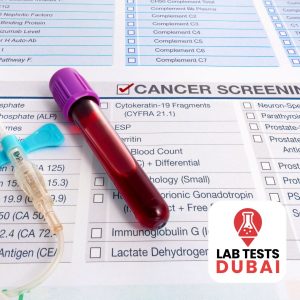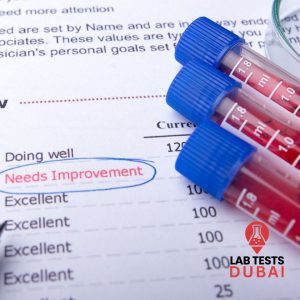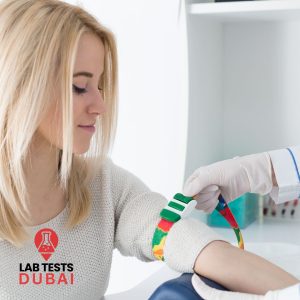Comprehensive Female Cancer Marker Test – Early Detection & Accurate Results
650,00 د.إ
FEMALE CANCER MARKERS PACKAGE
Cancer Marker Tests
- Alpha-Fetoprotein (AFP) – Lung Cancer Marker
- Beta-Human Chorionic Gonadotropin (Beta-HCG)
- CA-125 – Ovarian Cancer Marker
- CA 15-3 – Breast Cancer Marker
- CA 19-9 – Pancreatic Cancer Marker
- Carcinoembryonic Antigen (CEA) – General Cancer Marker
Description
Female Cancer Marker Test – Early Detection for Empowered Health
Cancer doesn’t wait. But you don’t have to be powerless.
The Female Cancer Marker Test is a comprehensive blood screening panel designed to detect early signs of female-specific cancers—breast, ovarian, cervical, liver, and gastrointestinal cancers—before symptoms appear. By measuring key biomarkers such as AFP, Beta HCG, CA-125, CA 15-3, CA 19-9, and CEA, this test offers high sensitivity and specificity, helping women take charge of their health with confidence.
At Lab Tests Dubai, we combine cutting-edge technology with fast, non-invasive testing to deliver results you can trust—within just 24 hours. Whether you’re monitoring your health, managing risk, or supporting recovery, this test is a vital step toward early detection and empowered wellness.
Why You Need This Test
Every woman deserves to know her risk—before it becomes a crisis.
The Female Cancer Marker Test is essential for:
- Women with a family history of cancer
- Those with genetic predispositions (e.g., BRCA mutations)
- Patients undergoing cancer treatment or post-remission monitoring
- Anyone seeking proactive, preventive health screening
This test isn’t just about diagnosis—it’s about early intervention. Detecting abnormal tumor marker levels early can expand treatment options, improve survival rates, and reduce the need for invasive procedures.
Knowledge is power. This test gives you both.
 Symptoms That Indicate You Should Take This Test
Symptoms That Indicate You Should Take This Test
Many cancers show no symptoms in early stages. But if you’re experiencing any of the following, don’t ignore them:
- Unexplained weight loss or fatigue
- Abdominal bloating, pain, or digestive changes
- Breast lumps, nipple discharge, or skin changes
- Irregular vaginal bleeding (especially after menopause)
- Pelvic pain or pressure
- Jaundice (yellowing of skin or eyes)
- Persistent back or stomach discomfort
These signs may be linked to benign conditions, but they can also point to ovarian, breast, liver, or pancreatic cancers. The Female Cancer Marker Test helps uncover the truth—early and accurately.
Natural Production of Tumor Markers: What You Should Know
Tumor markers are naturally present in the body at low levels. They become concerning when levels rise abnormally.
Here’s what each marker means:
1. Alpha-Fetoprotein (AFP)
- Normal role: Produced by the fetal liver; low levels in adults.
- Elevated in: Liver cancer (HCC), ovarian germ cell tumors.
- Also seen in: Cirrhosis, hepatitis (non-cancerous).
2. Beta HCG (Human Chorionic Gonadotropin)
- Normal role: Hormone of pregnancy.
- Elevated in: Gestational trophoblastic disease (e.g., molar pregnancy), ovarian germ cell tumors.
- Note: Not typically high in common ovarian cancers.
3. CA-125 (Cancer Antigen 125)
- Primary link: Ovarian cancer (especially epithelial).
- Also elevated in: Endometrial, fallopian tube, and peritoneal cancers.
- Benign causes: Endometriosis, fibroids, pelvic infections.
4. CA 15-3 (Breast Cancer Marker)
- Main use: Monitoring breast cancer progression and recurrence.
- Also elevated in: Lung, ovarian, and liver cancers.
- Mild increases: Can occur in benign breast disease.
5. CA 19-9
- Strongest link: Pancreatic and bile duct cancers.
- Also seen in: Colorectal, stomach, and liver cancers.
- Non-cancer causes: Pancreatitis, gallstones, cirrhosis.
6. Carcinoembryonic Antigen (CEA)
- Commonly used for: Colorectal cancer monitoring.
- Also elevated in: Breast, lung, gastric, and ovarian cancers.
- Smokers note: Slightly higher levels are normal in smokers.
🔍 Important: Elevated markers do not equal cancer. They signal the need for further evaluation by a specialist.
What Happens If Abnormal Levels Are Left Untreated?
Ignoring rising tumor markers can lead to devastating outcomes:
- Silent progression of ovarian or liver cancer to advanced stages
- Metastasis to vital organs like the liver, lungs, or bones
- Delayed treatment, reducing survival rates
- Increased need for aggressive therapies like chemotherapy or surgery
For example, ovarian cancer detected at Stage I has a 90%+ 5-year survival rate—but drops to less than 30% if found late. Early screening with the Female Cancer Marker Test can make all the difference.
How to Prepare for the Test
Getting tested is quick and simple:
- Fasting: 8–12 hours recommended (water allowed).
- Medications: Inform your doctor about hormonal therapies, supplements, or ongoing treatments.
- Avoid during menstruation: CA-125 can be temporarily elevated.
- Stay hydrated to ease blood draw.
- No strenuous exercise 24 hours before.
Sample: Serum (blood draw)
Method: Chemiluminescence Immunoassay (CLIA)
Turnaround Time: 24 hours
Test Overview: Your Health, Simplified
| Parameter | Details |
| Test Name | Female Cancer Marker Panel |
| Markers Included | AFP, Beta HCG, CA-125, CA 15-3, CA 19-9, CEA |
| Sample Type | Blood (Serum) |
| Methodology | Chemiluminescence |
| Turnaround Time | 1 Day (24 hours) |
| Testing Facility | Lab Tests Dubai (JAFZA & Home Visit Available) |
| Report Delivery | Secure digital report with reference ranges |
This panel is ideal for annual screening, high-risk monitoring, or post-treatment follow-up.
Frequently Asked Questions (FAQs)
Q1: Can this test diagnose cancer?
A: No. It’s a screening and monitoring tool. Abnormal results require follow-up with imaging, biopsies, or specialist consultation.
Q2: Who should take this test?
A: Women over 30, those with family history, BRCA mutations, or post-cancer care. Also ideal for proactive health seekers.
Q3: Can I take this test if I’m pregnant?
A: Beta HCG will be high during pregnancy. Discuss with your doctor for proper interpretation.
Q4: How often should I get tested?
A: Annually for prevention. Cancer patients may need every 3–6 months.
Q5: Is the test painful?
A: No. It’s a standard blood draw—quick and minimally invasive.
Q6: Can I book online with home collection?
A: Yes! Book now with Lab tests Dubai and schedule a home blood draw.
Take Charge of Your Health Today – Book Your Female Cancer Marker Test Now!
You don’t need symptoms to protect your future.
The Female Cancer Marker Test gives you the early warning system you deserve—helping you detect risks, monitor treatment, and gain peace of mind.
At Lab Tests Dubai, we make it easy to screen, monitor, and stay ahead—with fast, accurate, and confidential testing. Our home collection service brings lab-quality care to your doorstep.
👉 Early detection saves lives. Don’t wait for symptoms.







Reviews
There are no reviews yet.